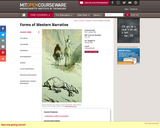
Major narrative texts from diverse Western cultures, beginning with Homer and concluding with at least one film. Emphasis on literary and cultural issues: on the artistic significance of the chosen texts and on their identity as anthropological artifacts whose conventions and assumptions are rooted in particular times, places, and technologies. Syllabus varies, but always includes a sampling of popular culture (folk tales, ballads) as well as some landmark narratives such as the Iliad or the Odyssey, Don Quixote, Anna Karenina, Ulysses, and a classic film. This class will investigate the ways in which the formal aspects of Western storytelling in various media have shaped both fantasies and perceptions, making certain understandings of experience possible through the selection, arrangement, and processing of narrative material. Surveying the field chronologically across the major narrative genres and sub-genres from Homeric epic through the novel and across media to include live performance, film, and video games, we will be examining the ways in which new ideologies and psychological insights become available through the development of various narrative techniques and new technologies. Emphasis will be placed on the generic conventions of story-telling as well as on literary and cultural issues, the role of media and modes of transmission, the artistic significance of the chosen texts and their identity as anthropological artifacts whose conventions and assumptions are rooted in particular times, places, and technologies. Authors will include: Homer, Sophocles, Herodotus, Christian evangelists, Marie de France, Cervantes, La Clos, Poe, Lang, Cocteau, Disney-Pixar, and Maxis-Electronic Arts, with theoretical readings in Propp, Bakhtin, Girard, Freud, and Marx.
- Subject:
- Arts and Humanities
- History
- Literature
- Material Type:
- Full Course
- Provider:
- MIT
- Provider Set:
- MIT OpenCourseWare
- Author:
- Cain, James
- Date Added:
- 01/01/2004

